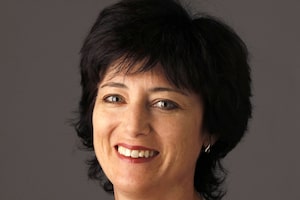Three Canadian hospitals
In a Canadian medical first, four people with severe kidney failure received new organs from living donors in simultaneous "kidney swap" operations in Vancouver, Edmonton and Toronto.
This innovative and logistically complex "domino" transplant began at exactly 10:30 a.m. (ET) in three time zones. That's when the donors, who all travelled from out of province, were anesthetized in two operating rooms in Toronto General Hospital, one in Edmonton's University of Alberta Hospital, and another at St. Paul's Hospital in Vancouver.
Despite the novel nature of the multicity, multiorgan procedure, the core complexity is actually one of ethics. Kidney swaps are based on the idea of paying it forward, whereby a donor whose kidney isn't compatible with their loved one, who needs a new kidney, agrees to donate to a stranger. In exchange, their partner receives a kidney from someone else.
The ethical fear is that when the patient receives a kidney, their loved one will rescind their offer to donate. That's why the procedural ballet must be so precisely synchronized, leaving no room for any donor to change his or her mind.
Fortunately, that didn't happen Wednesday night, and once the kidneys were removed from the donors, the four transplant operations went ahead in sequence, following months of planning by the Canadian Blood Services.
"This is a major step forward," said Ed Cole, head of the University Health Network's kidney transplant program in Toronto. "The people who got kidneys today would have waited on transplant lists for years, and everyone else on the list would have had to wait longer. It shows what can be done when we work together."
By Wednesday evening, the donors and recipients were recovering on different wards - to safeguard their anonymity. And four teams in three cities breathed a huge sigh of relief after the surgical marathon.
The pilot project is the model for the future, made possible thanks to the CBS's new national registry. It allows donors who can't give a kidney to their loved one because of incompatible blood group or tissue type to sign up in pairs to swap kidneys with another incompatible donor-recipient pair.
Kidney swaps have recently made headlines in the United States, with one group swap portrayed on a recent episode of Grey's Anatomy.
The idea, first pioneered in the Netherlands, makes sense because of the chronic shortage of kidneys. In Canada, 35,000 people have kidney disease and 3,000 are on the waiting list for a kidney from a deceased person, which can take eight years in Toronto and Vancouver. About 60 people die every year before a kidney becomes available.
Wednesday's domino chain of eight surgeries began with an altruistic donor from B.C. who offered to give a kidney to a stranger. The organ went to a person who had signed onto the CBS registry. That person's incompatible donor partner then gave to another patient in the registry, and the latter's incompatible partner gave to a third person in the registry. That third person's incompatible partner then gave to a patient on the waiting list.
"The first person is really a hero because they facilitated not just one, but four kidney transplants, with absolutely no personal gain," said Dr. Cole, who helped organize the surgeries. "This is a win-win for everyone."
The hospitals protect everyone's anonymity for ethical reasons; however, if a donor and recipient wish to meet after they have recovered from surgery, the doctors can facilitate this, noted John Gill, a transplant nephrologist at St. Paul's who also co-ordinated yesterday's success.
Launched earlier this year, the federal registry has about three dozen incompatible donor-recipient pairs looking to "swap" kidneys.
Surgeons at the Toronto General Hospital and the Ottawa Hospital both did a round of "kidney swap" surgeries this year in their own hospitals.
But Wednesday marked the first national domino exchange. It took months of teleconference calls, lab and immunology tests across three times zones, said Peter Nickerson, executive medical director of CBS's organs and tissues division. "It's an innovative program that shows the incredible co-operation among hospitals, provinces, surgeons and patients."
The CBS uses a sophisticated computer program to find matches, inputting the blood and tissue type of every donor and recipient in the national registry. The program then searches for compatibility, aiming for the highest number of matches and minimizing travel time for donors.
The CBS is expanding the registry to include incompatible donor-recipient pairs from all provinces, and is already planning a second domino transplant this summer. In cases where donors cannot travel, the CBS hopes to be able to "fly the kidney to the recipient," Dr. Gill said.
Kidneys from living donors can last up to 12 hours outside the body, and can be transported via Air Canada's "medi-desk," located in the cockpit of a plane, he added.
Last year, 40 per cent of the 1,200 transplants in Canada used kidneys from living donors. The success rate is higher than transplants from deceased donors, and the kidneys last longer. Studies show donors don't suffer long-term health consequences.
Replacing a faulty kidney also saves the health-care system $300,000 over a patient's lifetime, and frees the patient from dialysis, an expensive and time-consuming procedure that removes excess water and waste from the blood. "Kidney disease continues to grow," Dr. Nickerson said. "It affects people in all strata of life. It can be genetic, autoimmune or caused by diabetes."
Patricia Campbell, a U of A transplant nephrologist, said the more people who join the national registry, the greater the chance of finding a compatible kidney. "We are thrilled this happened," she said. "Everyone invested a lot of time and work in the background to ensure it was a success."
 Marina Jimenez
Marina Jimenez